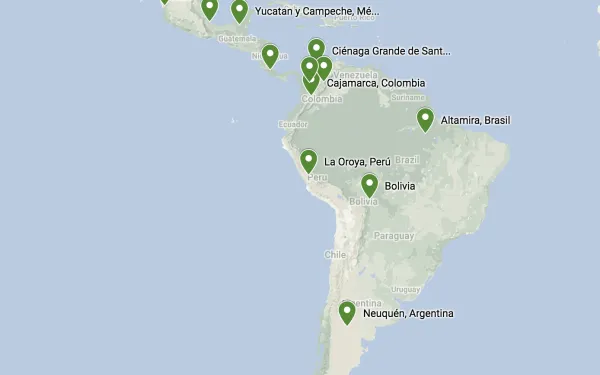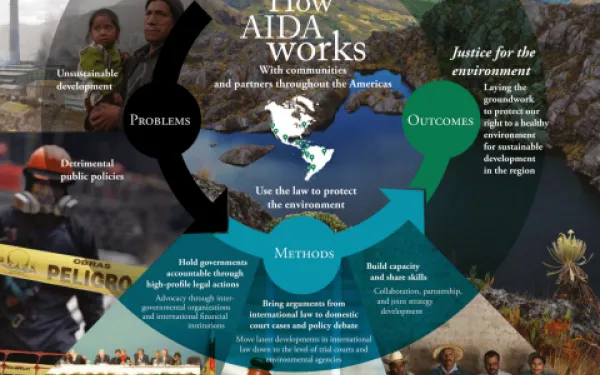
About Us
We protect the right to a healthy environment.
- Our attorneys understand the legal and political context: they are both from and live in Latin America.
- Our team includes scientific advisors whose knowledge and experience are employed to strengthen our legal strategies in defense of the region's people and environments.
- AIDA is a regional organization that enforces and strengthens international law, with team members from Chile to the United States.
- We provide free legal expertise and scientific support that bridges the gaps between communities, local movements, national organizations, governments, and international authorities.
- Our team has 20 years of experience in wielding the power of international law to win conservation gains for the region.
WHERE WE WORK

WHERE WE WORK
Our team works in offices from Chile to the United States. The issues and cases we handle involve people and places throughout the Americas. This map shows the locations of our current cases.
HOW WE WORK

HOW WE WORK
AIDA combines legal advocacy with education and alliance-building initiatives. We prioritize high-need, high-impact cases that can set replicable precedents. We propose feasible paths of action, provide legal language officials can adopt, and disseminate information on pending proposals. We also support our partners’ efforts by injecting arguments based on international law into advocacy and litigation.
Our History
Latin America is home to some of the world’s greatest environmental treasures. As the “lungs of the planet,” tropical forests in 23 Latin American nations sustain human populations everywhere. Natural resources extracted in Latin America provide raw materials, food, and energy that support contemporary lifestyles.
As globalization took hold, Latin America experienced an expansion of industrial activities that governments welcomed as agents of development. Mines, dams, other energy infrastructure, tourist resorts, and more were built without adequate protections for the environment or for communities — especially indigenous and other disempowered communities.
Affected people were fighting urgently to protect their territories and their right to a healthy environment. To help them, dedicated advocates and environmental organizations took on the joined forces of industry and government. Working with scarce resources, the organizations focused primarily on national efforts.
Some of these organizations realized they could not rely on domestic legal systems alone to prevent or limit harms caused by a globalized economy. They had to begin using international law, advocating at international institutions, and collaborating across borders to generate regional results and promote shared goals.
In 1998, to fill a gap in expertise with respect to international law and advocacy, environmental law groups from Colombia, Costa Rica, Mexico, Peru and the United States founded an independent organization — AIDA — to build and extend the capacity of national advocates. AIDA’s founders were Centro de Derecho Ambiental y de los Recursos Naturales (Cedarena, Costa Rica), Centro Mexicano de Derecho Ambiental (CEMDA, Mexico), Earthjustice (USA), Fundepublico (Colombia), and Sociedad Peruana de Derecho Ambiental (SPDA, Peru).
Under the leadership of its Co-Executive Directors, Anna Cederstav and Astrid Puentes Riaño, who guided AIDA from its inception, the organization strengthened its use of international law to protect the environment and advance human rights across Latin America. Through their commitment, technical rigor, and collaborative approach, AIDA evolved into a link between legal expertise and social movements for environmental justice.
Soon other organizations and movements from throughout Latin America began asking AIDA to provide legal assistance in environmental and related human rights matters. As government and international institutions became familiar with AIDA’s attorneys and gained trust in their expertise, they, too, requested AIDA’s legal support.
Today, AIDA bridges the gaps between communities, local movements, national organizations, governments, and international authorities.
For many years, we have witnessed AIDA’s important work in the Americas. In our field, it is relatively easy to identify the NGOs that are doing the most serious and professional work, and AIDA is undoubtedly one of those.
2261 Market Street STE 85043
San Francisco, CA 94114
Telephone: +1 (415) 779 8191
[email protected]
Dr. José Ma. Barragán 766 - Ground floor 1
Narvarte Oriente, Mexico City, 03023
Telephone: +52(55) 5212-0141
[email protected]
